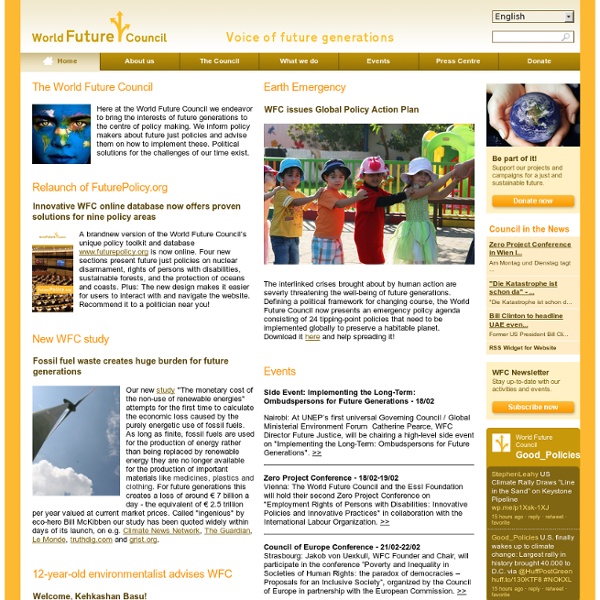



Welcome to WFSF Social Node | DaVinci Institute Open the Future Club of Amsterdam - Shaping Your Future in the Knowledge Society future facts blog thefutureoflife.org Predictive Signals - News Analytics And Data Mining Signals From the Web Humans will be extinct in 100 years says eminent scientist (PhysOrg.com) -- Eminent Australian scientist Professor Frank Fenner, who helped to wipe out smallpox, predicts humans will probably be extinct within 100 years, because of overpopulation, environmental destruction and climate change. Fenner, who is emeritus professor of microbiology at the Australian National University (ANU) in Canberra, said homo sapiens will not be able to survive the population explosion and “unbridled consumption,” and will become extinct, perhaps within a century, along with many other species. United Nations official figures from last year estimate the human population is 6.8 billion, and is predicted to pass seven billion next year. Fenner told The Australian he tries not to express his pessimism because people are trying to do something, but keep putting it off. Fenner said that climate change is only at its beginning, but is likely to be the cause of our extinction. Easter Island is famous for its massive stone statues.
Future Challenges | Home - futurechallenges.org Manila’s waterways are constricted by informal settlers. Photo courtesy: Chrischug-e-rodriguez (CC-BY- SA-3.0) They’re probably gambling with death and disaster, but the families who live in the danger zones of Metro Manila would rather not leave their homes. The reasons are mainly economic – they work near where they live, hence they would rather turn a blind eye to the hazards of living near creeks and estuaries. There are 580,000 informal settlers in Metro Manila, 105,000 of whom live in danger zones. But there was huge opposition.The people demanded in-city relocation, but the proposed resettlement areas were situated in the provinces. Fortunately for them, when Arroyo was replaced by President Benigno Aquino III in 2010, he approved a five-year-plan for the resettlement of informal settlers in on-city sites. The success of this plan, however, depends largely on how local officials like mayors and governors take the idea on board.
THE FUTURIST Magazine Releases Its Top 10 Forecasts for 2013 and Beyond Each year since 1985, the editors of THE FUTURIST have selected the most thought-provoking ideas and forecasts appearing in the magazine to go into our annual Outlook report. Over the years, Outlook has spotlighted the emergence of such epochal developments as the Internet, virtual reality, the 2008 financial crisis and the end of the Cold War. But these forecasts are meant as conversation starters, not absolute predictions about the future. We hope that this report--covering developments in business and economics, demography, energy, the environment, health and medicine, resources, society and values, and technology--inspires you to tackle the challenges, and seize the opportunities, of the coming decade. With no further ado, THE FUTURIST Magazine releases its top ten forecasts for 2013 and beyond. Video by FUTURIST magazine editor Cynthia G. 1. 2. 3. Future "farmers" may consist of householders recycling their food waste in their own aquariums. 4. 5. 6. 7. 8. 9. 10. Happy futuring